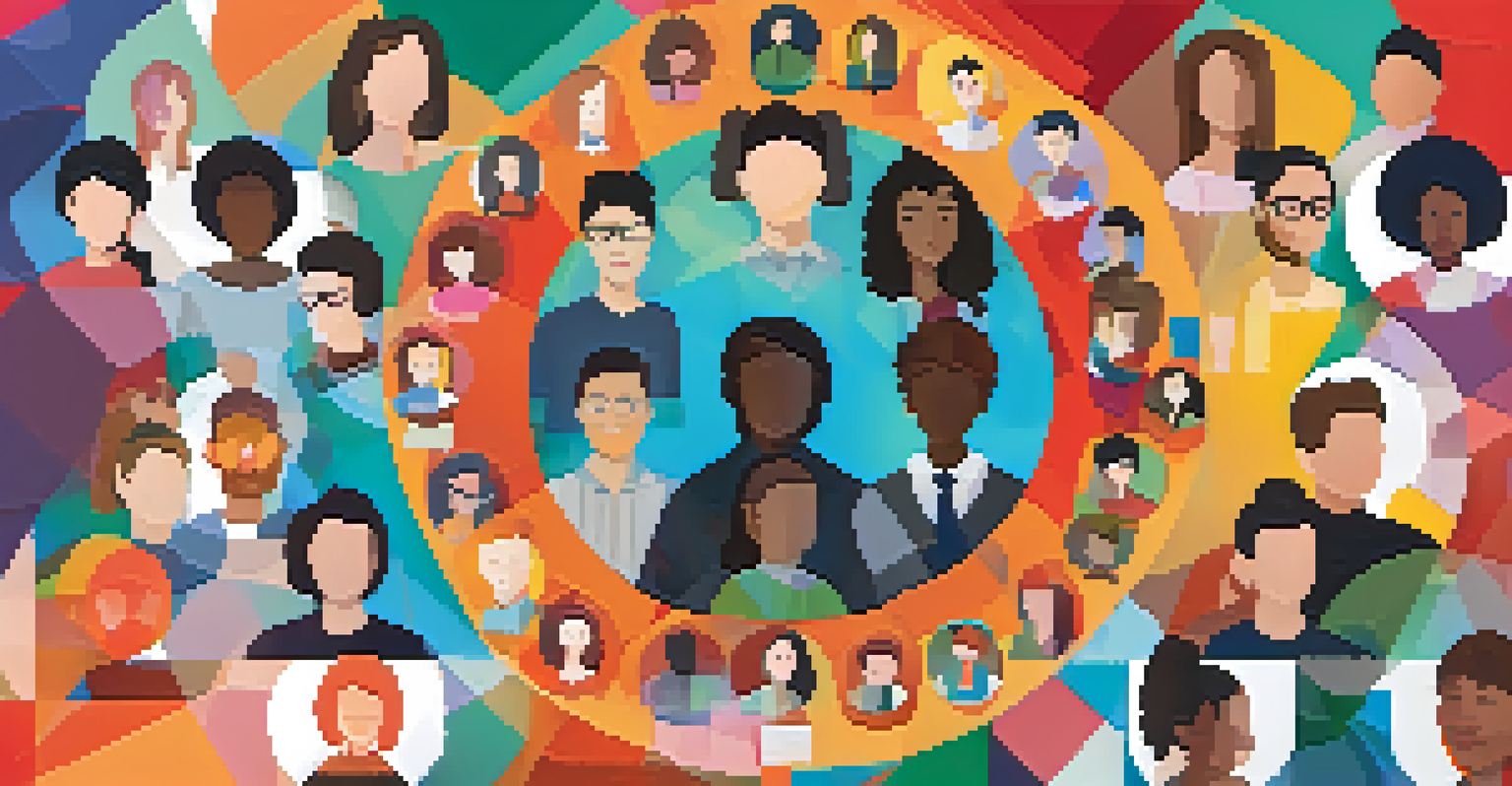The Role of Reflection in Online Learning Communities

Understanding Reflection in Online Learning
Reflection in online learning refers to the process where learners think critically about their experiences and knowledge. This practice is essential as it helps individuals assess their understanding and application of concepts. By taking a moment to pause and reflect, students can connect new information to their existing knowledge, creating deeper learning.
We do not learn from experience... we learn from reflecting on experience.
For instance, a student might participate in a discussion forum on a complex topic. After engaging with peers, they can reflect on their contributions and the ideas shared, leading to greater insight into the subject matter. Thus, reflection serves as a bridge between theory and practice, enriching the educational experience.
Moreover, reflection encourages self-awareness. By evaluating their strengths and weaknesses, learners can identify areas for improvement, which is crucial for personal and academic growth. This ongoing process of reflection not only enhances understanding but also fosters a culture of continuous learning.
The Importance of Community in Reflection
In online learning communities, the role of community cannot be overstated. When learners engage in reflective practices together, they create a supportive environment that encourages growth. This sense of belonging can significantly impact motivation and engagement levels, fostering a richer learning experience.

Consider a collaborative project where team members share their reflections on the process. By discussing what worked and what didn’t, they learn from each other’s experiences, creating a collective knowledge base. This shared reflection not only strengthens relationships but also enhances the overall learning outcome.
Reflection Enhances Learning Outcomes
Engaging in reflection improves critical thinking and problem-solving skills, leading to better academic performance.
Additionally, communities that prioritize shared reflection often experience increased accountability. When learners know their peers are observing their thought processes, they may feel more compelled to engage deeply and thoughtfully. This mutual encouragement can lead to a more vibrant and effective learning environment.
Methods for Encouraging Reflection
Encouraging reflection in online learning communities can be achieved through various methods. One effective approach is to integrate reflective prompts into discussions and assignments. Questions like 'What did you learn from this activity?' can guide learners to think critically about their experiences.
Reflection is the lamp of the heart; if it departs, the heart will have no light.
Another useful method is to create structured reflection activities, such as journals or blogs. These platforms allow learners to express their thoughts freely and revisit them later, reinforcing their learning. For instance, a weekly reflection blog can help students identify patterns in their learning and track their progress over time.
Furthermore, incorporating peer feedback can enhance the reflection process. When learners share their reflections with peers, they receive diverse perspectives, broadening their understanding. This interaction not only deepens their insights but also fosters a sense of community engagement.
The Impact of Reflection on Learning Outcomes
Research shows that reflection can significantly improve learning outcomes in online environments. When learners engage in reflective practices, they often achieve higher levels of critical thinking and problem-solving skills. This is because reflection encourages them to analyze and evaluate their experiences actively.
For instance, a study might reveal that students who regularly reflect on their learning outperform those who do not. This improvement can be attributed to the deeper processing of information that occurs during reflection. As learners take the time to think about what they have learned, they solidify their knowledge and enhance retention.
Community Boosts Reflective Practices
A supportive online learning community enhances motivation and accountability, enriching the reflective process.
Moreover, reflection can lead to greater satisfaction with the learning experience. When learners feel they have gained valuable insights and skills through reflection, they are more likely to view their educational journey positively. This satisfaction can foster lifelong learning habits, benefiting them in their future endeavors.
Overcoming Barriers to Reflection
Despite its benefits, many learners face barriers to effective reflection in online communities. Common challenges include time constraints and a lack of guidance. In a fast-paced online environment, students might struggle to find the time to pause and reflect on their experiences.
To combat these issues, educators can provide clear frameworks and dedicated time for reflection. By setting aside specific periods for reflective practice, learners can prioritize this important aspect of their education. For example, incorporating reflection into weekly schedules can encourage consistent engagement.
Additionally, fostering a culture that values reflection can mitigate these barriers. When communities celebrate and share reflective practices, learners may feel more motivated to participate. By highlighting the importance of reflection, educators can help students recognize its value in their learning journey.
Real-World Applications of Reflective Learning
Reflection is not just an academic exercise; it has practical applications in the real world. Many professionals engage in reflective practices to improve their skills and decision-making abilities. For instance, teachers often reflect on their teaching methods to enhance student engagement and learning outcomes.
In the workplace, employees may participate in reflective practices through performance reviews or team retrospectives. These activities encourage individuals to assess their contributions and identify areas for growth. By applying reflective practices, professionals can adapt and improve continuously.
Reflection Fosters Personal Growth
Regular reflection helps individuals become more aware of their goals and values, facilitating intentional life choices.
Moreover, reflective learning can enhance personal development. Individuals who engage in regular self-reflection are often more aware of their goals and values. This awareness can lead to more intentional choices in both personal and professional contexts, ultimately fostering a fulfilling life.
Conclusion: Embracing Reflection in Learning Communities
In conclusion, reflection plays a pivotal role in enhancing online learning communities. By encouraging learners to think critically about their experiences, we foster a deeper understanding and a sense of community. The benefits of reflection extend beyond academic achievement, impacting personal and professional growth.
As educators and facilitators, we have the opportunity to create environments that prioritize reflective practices. By implementing structured activities, promoting community engagement, and overcoming barriers, we can help learners unlock their full potential. This commitment to reflection can transform the learning experience for everyone involved.

Ultimately, embracing reflection in online learning communities leads to richer, more meaningful educational journeys. When learners reflect together, they not only enhance their understanding but also cultivate a supportive community that thrives on shared knowledge and growth.